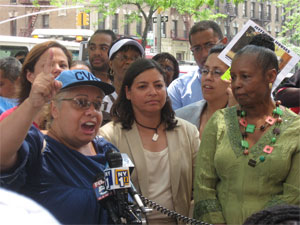
Many low-income people in NYC rely on public housing as one of the few sources of affordable housing available to them in this city of sky-rocketing rents. However, the conditions in public housing are often sub-par, with poor maintenance and major repairs left undone for years. These conditions are threatening to get worse, even while residents are forced to pay higher rents.
The New York City Housing Authority (NYCHA), which runs public housing, is facing a budget deficit of $225 million, largely due to major funding cuts from the federal and state governments. NYCHA has been scrambling to make up for this deficit, but most of the measures that it’s taking wind up hurting the residents of public housing: rent increases, additional fees charged for basic household appliances, delays in making urgent and essential repairs, and the planned layoff of more than 500 workers from an already understaffed agency.
Last Thursday, Community Voices Heard, a member-led grassroots organization of low-income New Yorkers, led housing advocates and elected officials on a tour of public housing developments to show them just how important it is that NYCHA gets much-needed funding (and utilizes it well, of course – just because the money’s there doesn’t mean it’ll be used right.)
In one apartment on the the tour, a bathroom wall had been left without repairs for two years; a sheet of plastic has been hung over a gaping hole, leaving pipes and hazardous materials exposed. In another building, the walls of a fire-damaged hallway have not been cleaned for over a year. Residents complained of stoves that haven’t worked for ages, one of which was removed two years ago because of a gas leak and not replaced until last week, when the media contacted NYCHA after the CVH tour.
Agnes Rivera, a CVH leader and a resident of one of the housing developments, spoke of the worsening situation in public housing and how important this housing can be:
We are bringing our elected officials on this tour to show them that our housing is deteriorating. The Housing Authority doesn’t have the money to make the repairs that the families living in public housing need…
I was in the shelter system, due to a domestic violence situation, and was lucky to have public housing as my safe haven. Public housing has helped me live in an affordable home and to afford sending my children to college. My children want to be able to afford the same things for their children.
At the press conference after the tour, CVH and their allies called for Governor Spitzer to sign the shelter allowance bill (S.4329/A.7905) which recently passed both houses of the New York State legislature and could add $47 million to NYCHA’s suffering budget. The bill would make the state’s contribution to NYCHA for residents receiving public assistance the same as the state’s current contribution to private landlords who house public assistance recipients. Coucilmember Rosie Mendez was among those calling on Spitzer to sign the bill:
There is no explanation for public housing authorities receiving less than half the payment private landlords receive for the same size apartment. I urge the Governor to sign the bill and avert the unthinkable consequence that NYCHA is financially unable to continue to provide quality, low-cost housing for New Yorkers that are least able to afford shelter in our city’s overheated private housing market.
Now, maybe Governor Spitzer is a little distracted by the whole Bruno debacle, but his attention needs to be drawn back to signing this crucial bill. Despite our capitalistic society that gives to each according to cash instead of need, public housing should not equal sub-standard housing for low-income people. Email, write to, or call Governor Spitzer to demand his prompt signature of the bill so that the much-needed funding can soon reach NYCHA and ultimately public housing residents.
